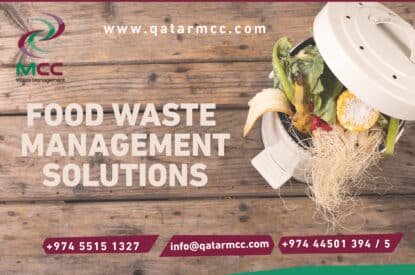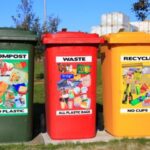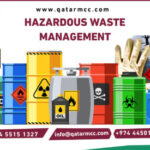Almost all establishments and institutions produce food waste that is harmful to the environment if not handled professionally inside the establishment itself and outside. Food waste varies from one place to another, depending on its types, amounts and effects, which is why we prepared a comprehensive blog about food waste covering all the aspects of food waste management and solutions in Qatar to help businesses re-manage their own garbage.
Food waste
Food waste is defined as any food type that is cast off or lost, either purposely or accidentally, at any phase of the food supply chain starting from production to consumption. This can include food that is still edible and ready for human consumption, in addition to the food that has become inedible or food that expired.
We gathered some food waste examples for you to help identify food waste types in your own establishment, so here are some examples of food waste:
- Expired food that is thrown away by households, restaurants, supermarkets, production companies or catering events
- Excess food or leftover food from parties, events, homes, restaurants and cafes
- Fruits and vegetables that aren’t bought by anyone due to their appearance, smell, or texture
- Food products that are damaged in production or transportation or storage
- Food that is sold at extremely high prices that are marketed to buyers who can’t afford it, passing the expiration date without purchases
- Any food used in cooking and not consumed, such as peels, trimmings and seeds
- Baked food that gets dry or rotten, such as bread and pastries
Impact of food waste

Whether you have a restaurant, café, food production company, food factory or even cooking at home, the impact of food waste is dangerous to the environment and contributes to greenhouse gas emissions, global warming, water pollution, and poisoning in the places where rotten food or food waste generally are close to edible food.
Don’t contribute to the increasing damages of food waste on the environment and follow successful food management solutions to help you have a healthy space for your business, home, office, or environment.
Food waste management solutions
Food waste management is the process of minimizing, recovering, and recycling food waste generated by households, restaurants, supermarkets, factories and other food-related establishments. Food waste management includes implementing different strategies to minimize the amount of food waste produced and to guarantee that any food waste that is generated is dealt with in a sustainable and environmentally friendly way.
Let’s say you own a company or a business that generates different types of food waste; what can you do to reduce the impact of food waste on your environment?
Check out these food waste solutions for a healthier environment:
- Feed excess food to animals
- Donate oils, fats and food waste to the industrial companies which use them in manufacturing
- Collaborate with businesses that produce fertilizers from food waste; some of them will buy it from you
- Don’t over-order food in huge uncontrollable amounts
- Segregate dry food from wet food by providing food waste bins in your establishment
- Use food waste signage to raise awareness on food waste impacts in your institution
Food waste management projects
We collected some ideas for onsite food management projects that can be performed easily by any group or institution.
First step – Measure Your Needs
The first step in implementing a food management project is to evaluate your business’s needs of food and compare that with the amount of food that gets discarded or thrown away.
Second step – Evaluate Supply Chain Damages
The second step is to find out at which stage exactly the food becomes ruined or inedible; most businesses like hotels and supermarkets face issues with the supply chain companies they’re contracting with because most amounts of food are damaged in the process of transportation or storage, so reassess the supply chain process.
Third step – Manage Onsite Food Storage
The third step in our food waste management project is to go over your food storage and check its efficiency. Ask yourself these questions to help you find out if the problem with increasing food waste is coming from your storage:
- Are you storing food in the places it requires, such as fridges?
- Do you prioritize using food that gets closer to its expiration date?
- Do you buy the amounts that you actually need or more?
- Does your staff know how to maintain the food at the right temperature?
- Is the storage clean and well-maintained?
We hope the previous questions help you assess your food management process onsite to solve any issues you might face with the business’s food storage.
Fourth step – Use food Segregation Bins
Whether you have a small, medium, or large business, it is very important to have food waste bins that serve your production needs and enable people to get rid of waste safely, easily and without hassle.
If you’re not using a waste separation bin for food then it is the right time to start using them, and if you’re questioning the importance of food waste bins then you should definitely check our list for the benefits of food waste bins.
NOTE: Food waste bins must be clearly labeled; each bin must have a food waste signage that clearly states what is it for. Use pictures or short clear statements to clarify the type of food waste that goes into each bin.
Benefits of food waste bins
- Make food recycling easier, faster and more efficient without any disturbances or issues
- Help increase the cleanness of your environment
- Raise awareness on food waste management onsite and offsite
- Contribute to the country’s zero waste goals
Food waste bins in Qatar

MCC offers various types of food waste bins in Qatar for you to choose from to help reduce food waste in Qatar as much as possible. Our food waste bins differ in size, color, use and material.
Choose your food waste bin in Qatar from these options:
- 1100 litre garbage bin
- 1100 litre blue bin for recyclable waste
- 360 litre garbage bin
- 240 litre waste bin
- 120 litre green garbage bin
Check out our garbage bins for further options that suit your business’s needs!
FAQs
What are 5 ways to reduce food waste?
- Reducing food waste by ordering reasonable amounts
- Donating excess food to people in need
- Using food waste bins onsite to collect discarded food
What are the top 3 types of food waste?
The highest types of food waste vary from one country to another but generally, these are some of the most wasted food types:
- Fruits and vegetables
- Seafood like fish and tuna
- Baked foods like bread and rice
Is food waste a problem?
Many business owners and individuals wonder if food waste is problematic or not, and the answer is yes. Food waste is a global issue, so following food waste solutions and food waste management projects is necessary to maintain a healthy life. Also, food waste sustainability helps in solving this problem on the run.
Where to find food waste management services in Qatar?
MCC provides excellent food waste management services in Qatar for companies, corporates, restaurants, cafes, schools, hospitals, constriction sites and factories. Contact MCC in Qatar through our number +974 44501394 / 5 or fill out the form to receive a special offer.
We reached the end of our blog post about food waste management and all of the details related to it, helping you gain a larger perspective on this field from its types to food management solutions. Make sure to check MCC waste management services and bins for businesses of all sizes and keep an eye on our blog for more helpful articles.



